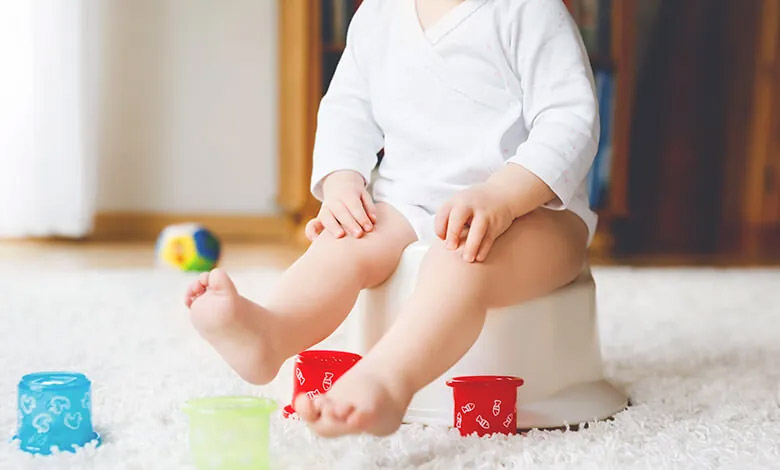- Having a baby with a gut issue can take a toll on the whole family
- Getting support from others can be helpful
- Make sure you don’t neglect your own self-care
Help – my baby has a gut issue, and I’m not coping

Key points
When your baby is experiencing a gut issue, it can affect everyone in the family mentally and emotionally. Sydney mum Lucy struggled to cope when her baby daughter developed ongoing constipation problems that involved reflux, vomiting and crankiness, and left her very underweight. “It was really hard to see her strain and push each time she tried to do a poo,” recalls Lucy. “It was even more distressing to see her weight drop to the lowest percentile and her doctor being worried. She weighed nothing – her legs had no definition and were so skinny.” Having an agitated and underfed baby left Lucy feeling constantly anxious and tense. “Mealtimes were just so stressful; I started to get nervous before each one,” she says. “I was sleep deprived and virtually had PTSD about her feeding times as she just wasn’t eating any solids or anything apart from milk. I would spend all this time trying to create yummy foods, which she just threw on the floor or ignored.” Most people didn’t understand what she was going through, which made it an isolating experience. Lucy found support on Facebook groups, and practical help from loved ones. Having a strong support network is key, she says. “I didn’t really click with anyone in my mother’s group and none of their babies ever suffered from digestive problems so they couldn’t relate, which in itself was frustrating,” she says. “My husband was great at taking over in mealtimes when he could, and my mum had some great ideas to try – apparently my sister and I were fussy eaters.” For any parents going through something similar, Lucy recommends finding a supportive doctor – for her, it made all the difference, on both a practical and emotional level. “Our doctor was really passionate about it as he has seen so many babies with digestive issues left untreated and it can become a huge issue as kids get older, affecting their mental health and happiness,” she says. “So his insistence to get on top of it helped my resolve in a lot of ways.”
Dealing with the frustration
Another Sydney mum, Nicole, found that one of the hardest aspects of having a baby with a gut issue is a feeling of powerlessness when nothing you do seems to help. “It’s unbearable – just the screaming thing is enough to drive you crazy,” she says. “I’d get really frustrated and think, ‘let’s go for a walk’. I’d put my son in the pram and he just would scream and I would have to pick him up, put him over my shoulder and then walk the pram with the other hand. And people will walk past and say, ‘oh, first-time mama’ and I just would burst into tears. I’d get home, and think, ‘how much longer?’” Because many of her son’s symptoms – including vomiting and reflux – are common for babies, it took a while for doctors to identify that there was a problem for Nicole’s son. Nicole sensed he might need extra help, but having no parenting experience meant she struggled to trust her instincts. “We kept hearing, ‘It’s a laundry problem, not a medical problem’, but I think there’s always that part of you that goes, ‘something’s not normal here’, even though you don’t have a reference point of what’s normal,” she says. After being referred to a paediatrician, Nicole’s baby was finally diagnosed with with gastro-oesophageal reflux disease (often called GORD) at 10 weeks old. Learn more about GORD here. Her advice to any parents who feel their baby might have a gut issue is to trust your instincts, and find a doctor who can guide you along the journey of recovery. “Educate yourself and get your baby assessed thoroughly, because that’s the only way you will know,” she says. “Because if you ask friends, they will say, ‘oh, all babies spew, all babies have reflux’. It is true that all babies have some degree of reflux, but that’s not GORD – GORD is a medical diagnosis that gets given treatment.” Knowledge is power, she says, explaining that the GORD diagnosis helped her cope better with her son’s screaming and crying. “Something just clicked and that anger dissipated,” she says. “Because I know he’s not being difficult, he is just uncomfortable. And that just gives me so much empathy for him.”
Make sure you support yourself
According to GP and health expert Dr Preeya Alexander, gut issues can be difficult for doctors to diagnose – which takes an emotional toll on parents. She often sees parents who are so focused on what their baby is going through they’ve neglected their own mental wellbeing. “I find a lot of my patients are just so stretched trying to ensure their child is okay they compromise their own self-care and are so exhausted. It is not uncommon for one or both parents to be in tears when I ask how they are going when it comes to treating their child’s gut issues. A constipated infant, a child with cow’s milk allergy – it’s an added thing to worry about on top of all the normal stuff that parents have to deal with,” she says. If you aren’t coping, reach out to an expert for help, Dr Preeya advises. “Talk to someone – check in with your GP about yourself, not about your child,” she says. “If you are struggling, exhausted, at breaking point – you are not alone, but talk to someone. It can be so refreshing and comforting to vent to someone independent and you might just pick up some tips to help along the way.” REMEMBER: This article is not to be substituted for medical advice. If you’re concerned about your baby crying excessively, or have questions about reflux, cow’s milk allergy, GORD or any other conditions, please speak to a healthcare professional such as a pharmacist, GP or maternal child health nurse. Disclaimer: Dr Preeya Alexander is an independent expert who was compensated for her time. References https://www.healthdirect.gov.au/gord-reflux
Related pages

Get in touch with our Careline experts
When your little one is unhappy or unwell you want reliable support from a trusted source. Our Careline team of nutritionists, dietitians and midwives specialise in infant and child health, offering free nutrition, feeding and product information.
Every feeding journey is unique
Not every parent can produce breast milk. No matter what choice you make, we will support your unique feeding journey.
We at Nutricia believe in providing the best nutrition for babies, which is why we recognise breast milk is uniquely superior for babies as it provides many benefits. It is important that mums have a healthy diet to support breastfeeding. A decision not to breastfeed, or partial bottle feed, may reduce breast milk supply making it difficult to reverse. The cost and social implications of using feeding methods should be considered. Always seek professional advice about feeding your baby. Ensure formula is used as directed as improper use can affect baby’s health.
REMEMBER: The information on this page is general only. If you have any concerns about your baby’s poo or questions about constipation or any other health concerns, please speak to a healthcare professional, like a Pharmacist, GP or Maternal Child Health Nurse.



